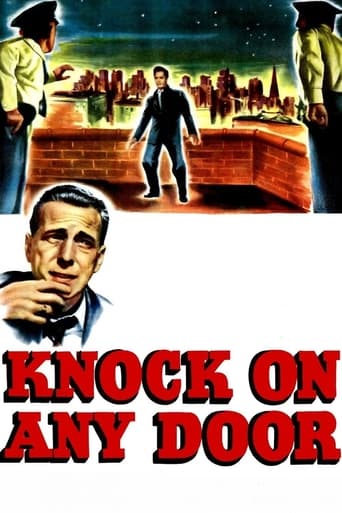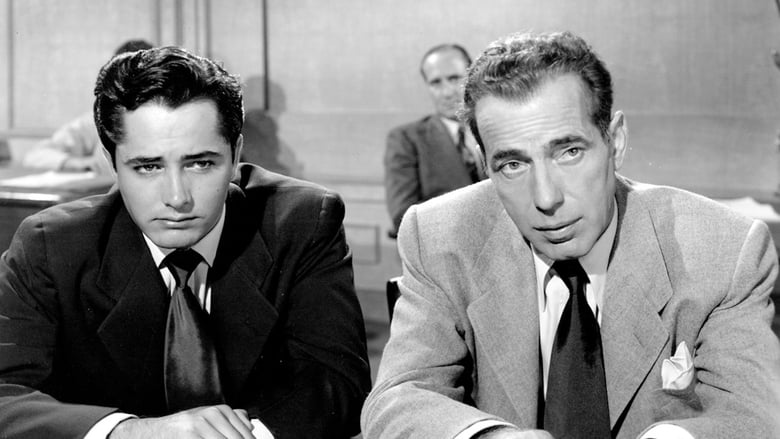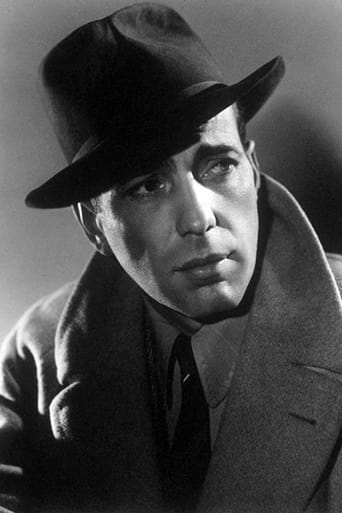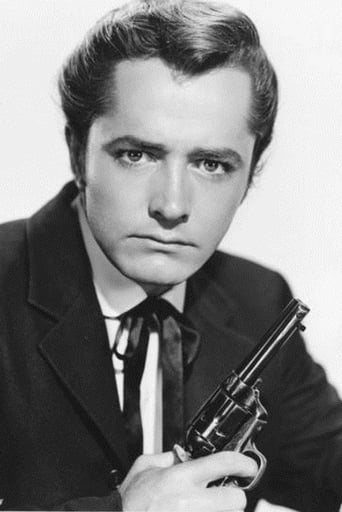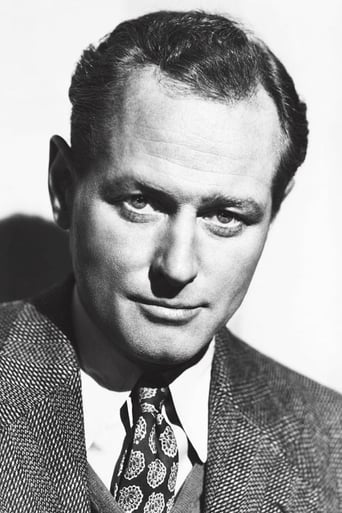Knock on Any Door (1949)
An attorney defends a hoodlum of murder, using the oppressiveness of the slums to appeal to the court.
Watch Trailer
Cast
Reviews
It is a performances centric movie
Excellent, Without a doubt!!
It’s not bad or unwatchable but despite the amplitude of the spectacle, the end result is underwhelming.
It’s sentimental, ridiculously long and only occasionally funny
I was mostly disappointed in Humphrey Bogart's performance as lawyer Andrew Morton who was too busy to defend and take care of a storekeepers assault charge while his little store was in the process of being robbed. The result being another lawyer from his firm who was unprepared to fight the case sent this poor innocent immigrant Italian storekeeper to the hoosegow where he unexpectedly dies of a heart attack and leaves his family without a father. The now fatherless son named Nick Romano played by John Derek is lost without his father's financial and parental support and guidance and ends up running with the wrong crowd in a desperate means to make some quick money by robbing storefronts and mugging innocent working stiffs. As the boy Nick Romano grows into a young man and learns his thieving trade in the school of hard "knocks" he runs into lawyer Andrew Morton who is burdened with a guilty conscience for the avoidable death of Nick's father while wrongfully in prison. So lawyer Andrew Morton attempts to keep an eye on the troubled youth Nick Romano but to no avail as Nick is eventually charged with the murder of an on duty police officer in Nicks neighborhood.The story of how Nick Romano found himself on trial for the murder of a police officer is told rather boorishly through Andrew Morton's interpretation to twelve (12) jurors. Typically in movie scenes that involve a prosecuting and defense attorney(s) there is a heated exchange while the accused is on the stand. In this case though the endless barrage of questions that the prosecutor district attorney Kerman played by George Macready throws at the befuddled accused Nick Romano is so choreographed that I thought I was witnessing a high school debate and not a murder trial.It was difficult to continue watching what seemed to be an ill prepared cast to handle a court room drama such that my mind kept wandering off as the film was unable to hold this viewers attention. Even Humphrey Bogart could not save this poorly delivered cookie cutter court room drama picture so the film title in my view would suggest that the vendors should please pass by my door as this dog bites with his honest review.p.s. Bogie's best picture in my view was (1951) The African Queen with co-star Katharine Hepburn and this is a must see if you want to see Bogart at his very best. Please read my full review on The African Queen dated August 04th, 2016
I had my doubts about Humphrey Bogart in this role. He played Andrew Morton - an attorney who grew up on the wrong side of the tracks but got out, getting (as he says) a law degree by night school and taking on contract and property law with a major law firm who gets dragged back to the old neighbourhood so to speak to defend a young man charged with the murder of a police officer. Something about this role seemed "un- Bogart." I really didn't think he'd work well. I was wrong. He's actually pretty convincing in the courtroom scenes; he does a good job with them. The basic problem with the movie is that more than half of it isn't a courtroom drama, and so it doesn't make the most effective use of Bogart as it should. Instead, most of the movie is really spent exploring the background of Nick Romano (John Derek) - the accused young man.I'd say first that the movie's a little bit laughable by modern standards. Honestly, Nick does't come across as that bad a guy (he drinks, he gambles, and, yes, he's pulled off some robberies) but that all seems pretty tame compared to what we see today on the news on a daily basis. Also, the neighbourhood he grew up in doesn't look all that bad, compared to - well - a few neighbourhoods today. So, in that sense, it doesn't strike home with a 21st century viewer. Even things like the press and prosecutor calling Nick "Pretty Boy" - maybe when this was made that would have carried a connotation; today, it just seems silly. So perhaps the basic story loses some of its power.It loses its power, because the long recounting of Nick's past is used by Morton as a way of defending him. The basic message Morton is offering seems to be that whatever Nick has become - it's not his fault. It's society's fault. There's a moralistic, preachy tone to this that grated on me a little bit - and I'm certainly not a conservative by any stretch of the imagination. There were extended periods when I felt I was being lectured at rather than entertained. I would guess, then, that today's conservatives must sneer at this movie and at Bogart's performance. Now, they'd probably sneer at Bogart anyway. He was, after all, a liberal Democrat who once took on the House Un-American Activities Committee during the great Communist witch hunt known as the Red Scare. I admire him for doing that. But I was put off by the tone of this movie.Having said that, Bogart's performance, when he was front and centre, did not put me off. I liked him in this. He surprised me in a role that I didn't really think would suit him. There are also enough twists and turns in the story (right up until the end) and enough uncertainty about Nick (did he do it or not) that, its overly moralistic tone aside, this wasn't a difficult movie to watch. It made its social point, I suppose, but it did so by focusing too much on Nick's background and the hardship of his upbringing at the expense of creating what probably could have been a more compelling courtroom drama. (6/10)
Humphrey Bogart's first film away from the controlled environment of Warner Brothers shows its technical flaws, particularly in the script which consists of scene after scene of relentless polemical exposition detailing the supposed evidence for why society has just as much a blame as the criminals living in the slums produced by them. This is not a new message from the movies and after World War II, the intent to clean up the streets of America became much more of a signature statement for the left-leaning political crowd as a way to counter the focus on international affairs. Bogart and director Nicholas Ray were certainly huge figures in that movement but Bogie's first time as producer and Ray's second feature film leave much to be desired. Most of the performances are either too stiff or too exaggerated. Only Bogie manages to maintain a collected and understated performance despite his unnecessary preaching at the end. Perhaps no other actor in history portrays hard-edged cynicism better than Bogart, which makes it all the more surprising that his character remains this way for much of the film only to jump on society in the final scene. Ray's direction is nothing too special as he was still feeling his way around a movie set. He does, however, exhibit some interesting and striking visual tricks, foreshadowing future films to come.
Accused of killing a policeman, ageing juvenile delinquent John Derek (as Nick "Pretty Boy" Romano) turns to lawyerly father figure Humphrey Bogart (as Andrew Morton) for defense. Mr. Bogart was acquainted with Mr. Derek's similarly jailed father, and had been trying to rehabilitate the young man, off and on, over the years. Derek swears he is innocent; and, believing him, Bogart takes the case. District Attorney George Macready (as Kerman) is just as sure that Derek is guilty. When the trial begins, Bogart tells the unfortunate story of Derek's life, which is shown in flashbacks Derek's life is, indeed, filled with misfortune. After the death of his father, young Derek is reared in slums; caught stealing, he is sent to reform school. Upon release, Derek fails to "go straight", despite getting a legitimate job, and marrying the attractive, compassionate young Allene Roberts (as Emma). During the flashback sequences, the film's weakness is exposed - while there is nothing wrong with his performance, Derek isn't given enough script to thoroughly make the film's point: that young men like him are "angels with dirty faces." This theme, that society was the cause of juvenile delinquency, had been a subtle part of movies during the 1930s-'40s. "Knock on Any Door" makes the theme explicit; but, the film does not offer strong enough characterizations to back up its thesis.Willard Motley's original novel was much clearer, undoubtedly; an accurate film adaptation was unlikely in 1949. Mr. Motley's sequel "Let No Man Write My Epitaph", was adapted for film, more successfully, in 1960. Together, the Motley novels might make an interesting "epic" re-make. Still, Nichols Ray and Bogart make "Knock on Any Door" interesting viewing. The supporting cast is full of faces to spot: Dooley Wilson, Sid Melton, John Mitchum, and others. ****** Knock on Any Door (2/21/49) Nicholas Ray ~ John Derek, Humphrey Bogart, George Macready, Allene Roberts
